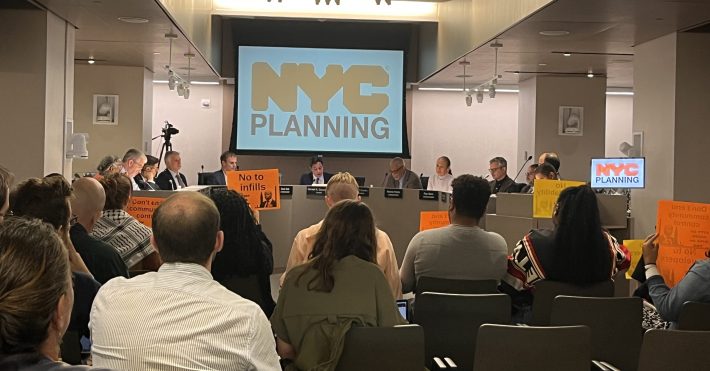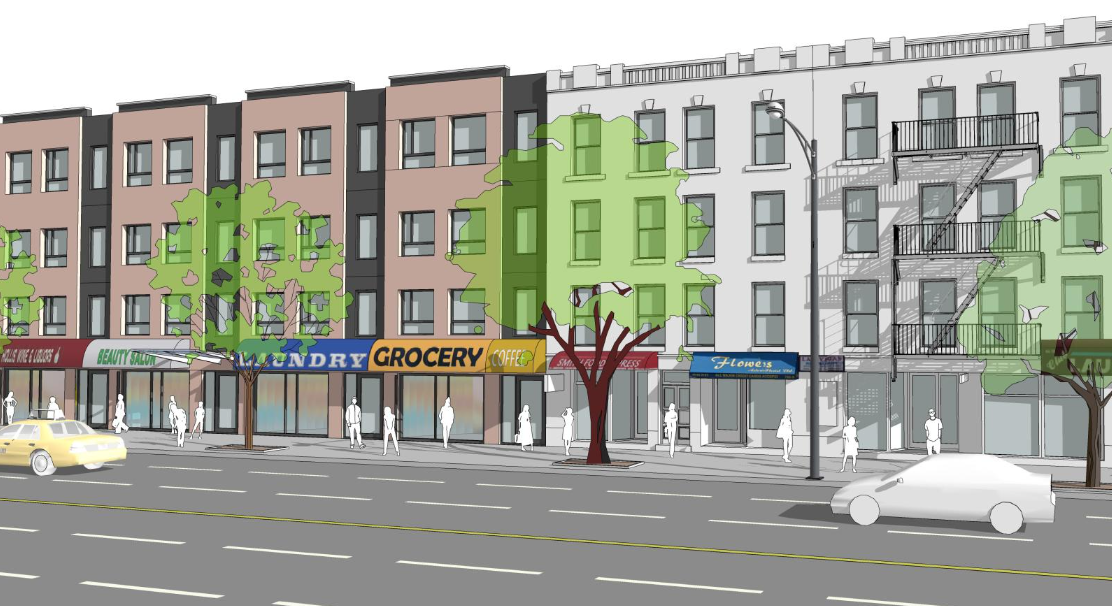Mayor Adams’s sweeping "City of Yes" zoning initiative that would spur new housing construction by eliminating costly parking mandates took one step closer to reality on Wednesday, thanks to the overwhelming support of the City Planing Commission.
In a 10-3 vote, the 13-member panel approve the plan largely intact, though the proposal now heads to the City Council, where it faces an uncertain future in a legislative body riven by urban vs. suburban, car vs. transit, NIMBY vs. YIMBY, density vs. low-rise conflicts.
The mayor's bid to get rid of mandatory parking is still a key component of the plan. Currently, the parking requirement drives up costs as well as prevents developers from saving that space for housing in neighborhoods that don't need parking — but residents of lower-density outer-borough neighborhoods oppose getting rid of parking mandates, arguing that new residents will be forced to park their cars on the street, taking away parking from existing residents.

After the vote, though, Planning Commission Chairman Dan Garodnick again pointed out that getting rid of the requirement is key to building more housing.
“We have seen over time that the cost of parking spaces in places where it is not needed has come at the expense of housing units, or has driven up the cost of those housing units," he told Streetsblog. "We included [the elimination of the mandate] in this proposal because we didn't want city government to be responsible for those conflicts.”
The mandates hinder development by forcing builders to comply with arbitrary parking requirements, creating a situation where they build less housing than the zoning allows in order not to trigger the mandates. Other times, developers build more parking than the mandatory minimum.
“I've now been around here for long enough to know that we have not infrequent requests for relief from the mandate,” said Garodnick. “And we see just as often, if not more often, people who are going well above what the minimum mandate is. So to me, we've landed in a good place, and we encourage the Council to take a hard look at this.”
If approved, the plan will bolster the city’s stock of “missing middle” housing, which are multi-unit residential buildings that are at scale in low-density areas like moderately sized multifamily buildings, accessory swelling units, duplexes, fourplexes, courtyard complexes, and multiplexes. Restrictive zoning practices that started in 1961 and continued throughout the Bloomberg years make these types of housing hard to build.
Beyond the parking change, the plan will do the following:
- Create a bonus for roughly 20 percent more housing in developments, as long as the additional homes are permanently affordable.
- Legalize small accessory dwelling units, like backyard cottages or converted garages.
- Invest in transit-oriented development and Town Center zoning, which would allow three- to five-story apartment buildings near transit and along commercial corridors.
- Allow development on large lots known as campuses, including faith-based organizations, that are today limited by outdated rules from using existing development rights.
- Enact new high-density zoning districts that would allow more housing, including mandatory affordable housing, in high-demand, central areas where it is urgently needed.
- Re-legalize small and shared housing models with common facilities like kitchens. That will make it easier to convert offices and other non-residential buildings into housing.
The Planning Commission largely kept the plan intact, though the final proposal would no longer allowing "infill" on NYCHA campuses and would continue to allow off-site affordable housing to count toward a zoning bonus.
The three out of 10 commissioners who opposed the plan – Alfred Cerullo, Juan Camilo Osorio, and Leah Goodridge – said their "no" vote stemmed from concern about housing affordability, maintaining low-density districts, and the city’s framing of the proposal as addressing social justice.
Even with these rejections, a new poll from Princeton researcher Adrian Pietrzak shows most New Yorkers are on board. Only 11 percent of registered voters “strongly oppose” the proposal, his survey shows.

But City of Yes is by no means a done deal. Several supporting groups (including Open Plans, which shares a parent organization with Streetsblog) are rallying at City Hall on Thursday to keep the conversation focused on the importance of removing parking mandates. Council members Lincoln Restler, Tiffany Cabán and Shahana Hanif are expected to attend.
Garodnick remains optimistic, but also said that additional modification may be inevitable.
“I like to think that it's a perfect product, but also recognize that this is a process where they will surely make changes,” said Garodnick. “And that's OK; we look forward to that conversation.”






